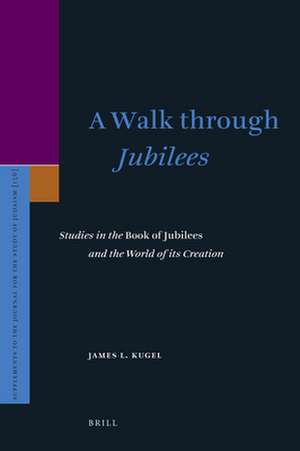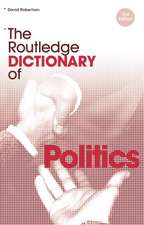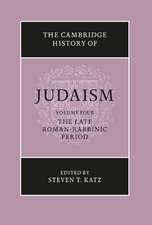A Walk through <i>Jubilees</i>: Studies in the <i>Book of Jubilees</i> and the World of its Creation: Supplements to the Journal for the Study of Judaism, cartea 156
Autor James L. Kugelen Limba Engleză Hardback – mar 2012
Din seria Supplements to the Journal for the Study of Judaism
- 18%
 Preț: 869.83 lei
Preț: 869.83 lei - 18%
 Preț: 795.02 lei
Preț: 795.02 lei - 18%
 Preț: 709.19 lei
Preț: 709.19 lei - 18%
 Preț: 715.27 lei
Preț: 715.27 lei - 18%
 Preț: 683.49 lei
Preț: 683.49 lei - 18%
 Preț: 627.51 lei
Preț: 627.51 lei - 18%
 Preț: 1014.51 lei
Preț: 1014.51 lei - 18%
 Preț: 753.39 lei
Preț: 753.39 lei - 18%
 Preț: 1017.77 lei
Preț: 1017.77 lei - 18%
 Preț: 960.35 lei
Preț: 960.35 lei - 18%
 Preț: 786.51 lei
Preț: 786.51 lei - 18%
 Preț: 882.93 lei
Preț: 882.93 lei - 18%
 Preț: 1587.85 lei
Preț: 1587.85 lei - 18%
 Preț: 819.04 lei
Preț: 819.04 lei - 18%
 Preț: 787.21 lei
Preț: 787.21 lei - 18%
 Preț: 1060.16 lei
Preț: 1060.16 lei - 18%
 Preț: 910.73 lei
Preț: 910.73 lei - 18%
 Preț: 774.67 lei
Preț: 774.67 lei - 18%
 Preț: 1214.12 lei
Preț: 1214.12 lei - 18%
 Preț: 906.32 lei
Preț: 906.32 lei - 18%
 Preț: 1352.83 lei
Preț: 1352.83 lei - 18%
 Preț: 1095.63 lei
Preț: 1095.63 lei - 18%
 Preț: 717.60 lei
Preț: 717.60 lei - 18%
 Preț: 906.71 lei
Preț: 906.71 lei - 18%
 Preț: 972.46 lei
Preț: 972.46 lei - 18%
 Preț: 908.89 lei
Preț: 908.89 lei - 18%
 Preț: 1311.20 lei
Preț: 1311.20 lei - 18%
 Preț: 717.45 lei
Preț: 717.45 lei - 18%
 Preț: 866.54 lei
Preț: 866.54 lei - 18%
 Preț: 865.92 lei
Preț: 865.92 lei - 18%
 Preț: 1239.65 lei
Preț: 1239.65 lei - 18%
 Preț: 716.67 lei
Preț: 716.67 lei - 18%
 Preț: 868.25 lei
Preț: 868.25 lei - 18%
 Preț: 691.89 lei
Preț: 691.89 lei - 18%
 Preț: 867.95 lei
Preț: 867.95 lei - 18%
 Preț: 1173.06 lei
Preț: 1173.06 lei - 18%
 Preț: 680.27 lei
Preț: 680.27 lei - 18%
 Preț: 742.33 lei
Preț: 742.33 lei - 18%
 Preț: 1120.11 lei
Preț: 1120.11 lei - 18%
 Preț: 683.32 lei
Preț: 683.32 lei - 18%
 Preț: 713.43 lei
Preț: 713.43 lei - 18%
 Preț: 797.06 lei
Preț: 797.06 lei - 18%
 Preț: 832.86 lei
Preț: 832.86 lei - 55%
 Preț: 897.63 lei
Preț: 897.63 lei - 18%
 Preț: 660.96 lei
Preț: 660.96 lei - 18%
 Preț: 893.36 lei
Preț: 893.36 lei - 18%
 Preț: 706.93 lei
Preț: 706.93 lei - 18%
 Preț: 722.55 lei
Preț: 722.55 lei - 18%
 Preț: 929.15 lei
Preț: 929.15 lei
Preț: 1386.27 lei
Preț vechi: 1690.57 lei
-18% Nou
Puncte Express: 2079
Preț estimativ în valută:
265.29€ • 288.07$ • 222.85£
265.29€ • 288.07$ • 222.85£
Carte disponibilă
Livrare economică 01-15 aprilie
Preluare comenzi: 021 569.72.76
Specificații
ISBN-13: 9789004217683
ISBN-10: 9004217681
Pagini: 434
Dimensiuni: 155 x 235 mm
Greutate: 0.75 kg
Editura: Brill
Colecția Brill
Seria Supplements to the Journal for the Study of Judaism
ISBN-10: 9004217681
Pagini: 434
Dimensiuni: 155 x 235 mm
Greutate: 0.75 kg
Editura: Brill
Colecția Brill
Seria Supplements to the Journal for the Study of Judaism
Notă biografică
James Kugel, Starr Professor of Hebrew Literature (emeritus) at Harvard University, is a specialist in the Hebrew Bible and Jewish writings of the Second Temple period. His books include The Idea of Biblical Poetry, In Potiphar’s House, The Bible As It Was, The God of Old, The Ladder of Jacob, and How to Read the Bible.
Cuprins
1. A Walk Through Jubilees: an Exegetical Commentary
2. The Sources of Torah in Jubilees
3. On the Contradictions in Jubilees
4. Divine Epithets in Jubilees
5. Which Is Older, Jubilees or the Genesis Apocryphon?
6. The Aramaic Levi Document and the Book of Jubilees
7. 4Q225 “Pseudo-Jubilees”
8. Jubilees, Philo, and the Problem of Genesis
2. The Sources of Torah in Jubilees
3. On the Contradictions in Jubilees
4. Divine Epithets in Jubilees
5. Which Is Older, Jubilees or the Genesis Apocryphon?
6. The Aramaic Levi Document and the Book of Jubilees
7. 4Q225 “Pseudo-Jubilees”
8. Jubilees, Philo, and the Problem of Genesis












